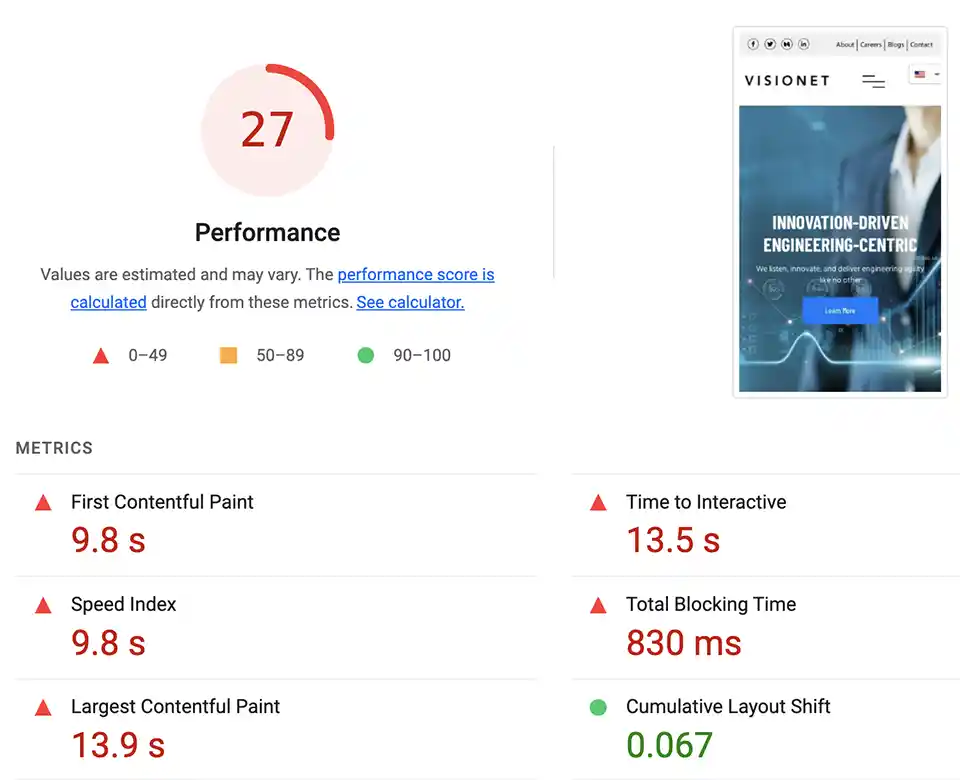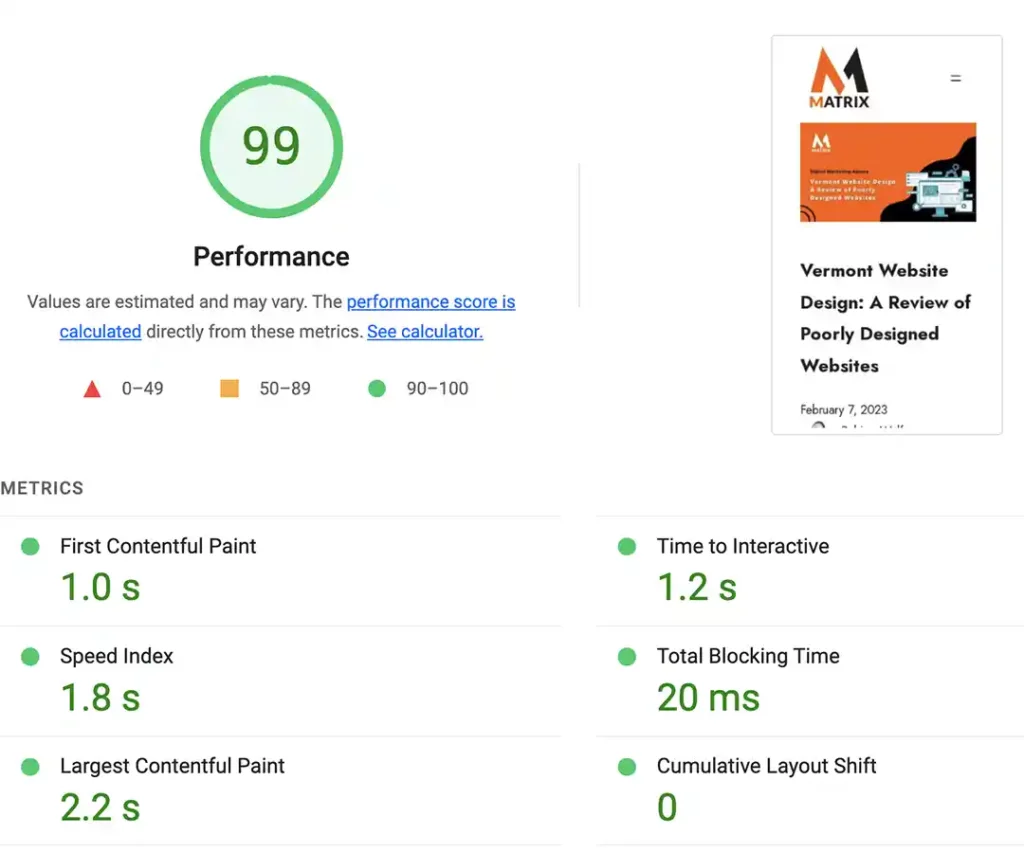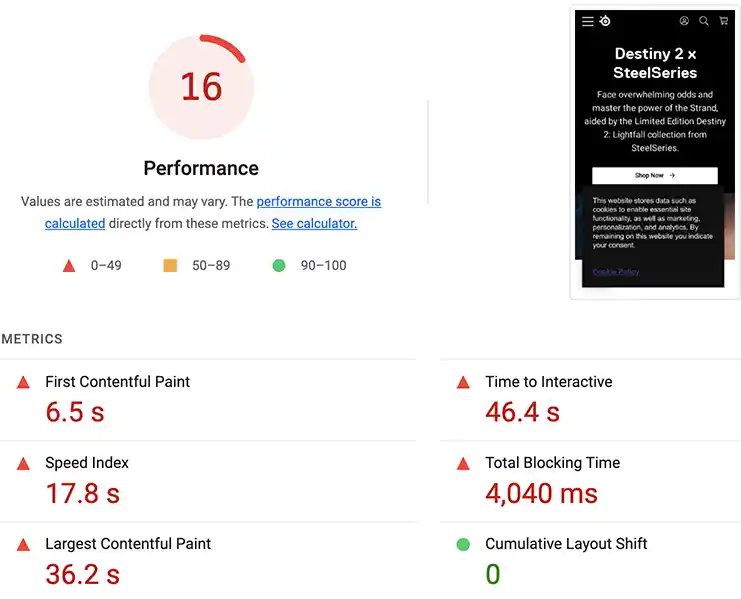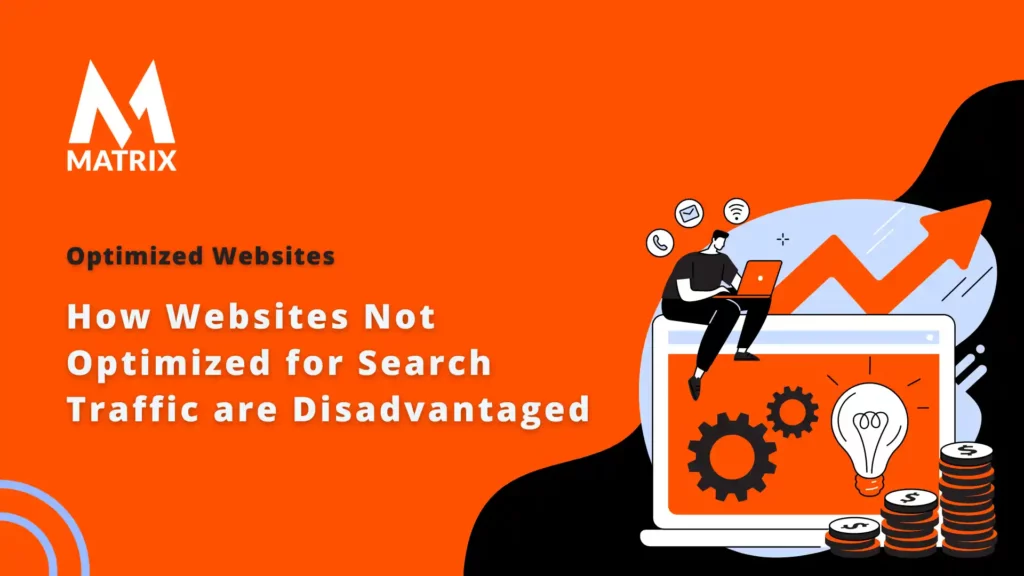How websites not optimized for search traffic are disadvantaged
Learn how websites not optimized for search traffic are disadvantaged and what to do about it
Do you need help to get your website noticed? Are customers not finding your business online? If so, it’s likely because you haven’t optimized your website for search traffic.
In this article, we’ll explore why optimizing your website for search traffic is important and the steps you can take to make sure your website stands out from the rest! OpenAI and ChatGTP will not take over the world of search anytime soon – so don’t rely on them alone!
Do you need help to get your website noticed?
SEO is essential for any website to be successful, as it helps to increase visibility and improve rankings in search engines.
Learn why optimizing your website for search traffic is important and the steps you can take to make sure your website stands out from the rest! OpenAI and ChatGTP will only take over the world of search for a while.
With SEO, you won’t have to worry about customers not finding your business online or losing potential customers and revenue due to a lack of visibility. You can ensure that your website will stand out from the competition with optimized content that ranks higher in searches.
Read this article now and learn how SEO can help you get more visitors to your site! Best Practices for AI Content Creation
Stats from 2025 about website design.

Statistics show that websites optimized for SEO yield better customer engagement and revenue results. According to recent studies, SEO optimization yields 77% higher click-through rates than non-optimized websites.
Businesses that optimize their website for search engines see a 258% increase in organic traffic compared to those that do not. Furthermore, businesses with an optimized website generate more leads and have customers who stay on the site longer and are more likely to purchase products or services.
Optimizing your website pays off: businesses that invest in SEO enjoy an 8.5x return on investment (ROI), significantly higher than other digital marketing strategies, such as pay-per-click advertising (PPC).
Businesses that optimize their website content with keywords have seen up to 500% growth in search engine rankings, boosting visibility and overall success.
When it comes to mobile usage, optimizing your website for mobile devices is essential as well. 69% of webpages are now viewed on mobile devices, making it even more important for your website to be optimized for these platforms.
Mobile users spend more time browsing through websites and convert at a higher rate than desktop users, so having an optimized website is key if you want to take advantage of this growing market segment.
Effective meta descriptions are critical for your SEO strategy. A well-crafted meta description can help improve CTR by up to 9%, providing visitors with a quick overview of the webpage – increasing the likelihood of them clicking through and engaging with your content or product/service offerings.
Ultimately, optimizing your website for search engine visibility is essential to maximize customer engagement and revenue potential – ignoring this step could prove very costly! Investing in SEO will help ensure your business stands out from the competition and enjoys long-term success.
What is OpenAI?
OpenAI is an artificial intelligence research laboratory focused on creating an ethical, safe, and beneficial AI. Elon Musk and Sam Altman founded it in December 2015 to research and develop friendly Artificial Intelligence (AI) to benefit humanity.
OpenAI’s projects are open-source and include a variety of tasks such as robotics, natural language processing (NLP), computer vision, reinforcement learning, unsupervised learning, etc.
They also provide an API for developers to build intelligent applications that anyone can use. OpenAI is committed to building responsible AI to help solve world problems without harming the planet or its inhabitants.
What is ChatGPT?
ChatGPT is a natural language processing (NLP) model developed by OpenAI that can generate natural-sounding text and have meaningful conversations. It is designed to accurately capture the context of a conversation, learn from it, and generate more accurate responses than traditional conversational AI models.
ChatGPT can be used for larger applications such as customer service chatbots or virtual assistants. It can also be applied in smaller projects, such as generating automated articles or personalized content based on keywords.
How often should I update my website?

One of the most important factors regarding website optimization is how often your website is updated. We are tuning our website every week.
Mobile-optimized websites convert websites to mobile-friendly ones optimized for mobile use, which is vital for success.
Regular updates are essential for keeping your website relevant and visible in search engine results. With frequent updates, search engines will notice your site more often, and you’ll be able to keep up with the ever-changing SEO best practices.
Affordable SEO Solutions That Drive Real Results
Matrix Marketing Group Delivers Customized SEO Strategies with Transparent Pricing for Maximum ROI. See SEO Services.
For most websites, updating your content regularly is the key to staying ahead of the competition and improving your rankings in search engine results. You should update your website at least once a month to ensure it remains fresh and optimized for SEO. This will give you time to make any necessary changes or add new content that can help boost your rankings.
In addition to regularly updating content, ensuring that all website components are up-to-date is critical for maintaining optimal performance. This includes ensuring that all plugins and software used on the site are kept up-to-date and checking for any security loopholes or vulnerabilities in the code.
Keeping these elements up-to-date will help visitors have an enjoyable experience when they visit the site and improve overall user experience scores, which can positively impact SEO performance.
Finally, ensuring that all technical aspects of your website, such as meta tags, schema markups, HTML headings, image alt tags, and internal linking structures, are optimized can also help improve rankings in search engines.
By reviewing these elements regularly and making necessary changes or improvements, you’ll be able to ensure that you’re doing everything possible to maximize visibility in search engine results pages (SERPs). AI vs. Human Content: Navigating the Future of Storytelling

All in all, optimizing your website for search traffic requires regular maintenance and updates. This can involve anything from tweaking page titles or meta descriptions to adding new content or fixing broken links – but taking the time to do these tasks regularly will pay off in increased visibility, improved user experience scores, and greater success with organic traffic!
The major challenge for the marketing team is to update the website regularly.
The major challenge for the marketing team in updating the website regularly is finding enough time and resources to keep up with the ever-changing SEO best practices. Even with the help of automated tools, it can be difficult to remain on top of all changes and new developments in search engine optimization.
To ensure that their website is optimized for search traffic, marketers must dedicate time and resources toward researching new trends and best practices, making updates based on those findings, testing different techniques for optimizing content for SEO, and continuously monitoring performance.
In addition to finding sufficient time and resources for these tasks, marketers must also remember that SEO best practices are constantly changing. As such, they must stay updated on technological shifts or user behavior that could affect their website’s rankings.
This can be daunting as there is always something new to learn or an existing practice that needs to be updated regarding SEO. Furthermore, many marketers may need help to stay ahead of competitors by taking advantage of the latest optimization techniques or having more experience in this area than they do.
Content That Converts: Transparent Pricing for Maximum ROI
Explore Matrix Marketing Group’s Flexible Pricing Plans for Premium Content and Marketing Solutions Tailored to Your Goals.
Fortunately, there are ways that marketers can optimize their websites correctly without becoming overwhelmed by all the jargon or falling behind their competition. Investing in reputable tools like Google Analytics or Moz Pro can help them track key metrics like organic search clicks, site speed, and keyword rankings over time. Hence, they know how well their website performs compared to other sites in their industry.
Marketers should also work closely with experienced professionals from an SEO agency who will be able to provide advice on everything from web design and development to technical aspects of optimizing content for search engine algorithms. Finally, reading industry news from respected sources such as Search Engine Watch or Moz Blogs can help marketers stay informed about relevant topics related to SEO best practices and trends so they get all the important updates.
Overall, staying up-to-date with the latest SEO best practices and trends is essential if you want your website’s visibility and ranking performance to remain competitive over time – but it’s not something you should take lightly either! Investing in reliable tools and consulting experts when necessary can be invaluable investments to ensure your website remains optimized while still allowing you enough time (and energy) to focus your attention elsewhere.
Why farm equipment suppliers CEO should care about website ranking

The CEO of a farm equipment supplier should care about website ranking because it can directly affect the business’s success. Search engine rankings are key to driving organic traffic to a website, which can lead to increased sales and brand visibility. Optimizing a website for SEO is difficult as it requires regular maintenance and updates, but the potential benefits far outweigh the effort.
SEO optimization can mean the difference between success and failure for farm equipment suppliers. Businesses that rank highly on search engine results pages (SERPs) will receive more organic visits from potential customers looking for their products or services. Farm equipment suppliers have an advantage over competitors who rank lower in SERPs, as prospective buyers will take longer to find those sites.
Optimizing a website for SEO also helps build trust with potential customers by demonstrating expertise in their industry through well-written content and assurances about product quality. A higher ranking in SERPs also signals that a business is legitimate and active within its market, encouraging more clicks and conversions from visitors.
In addition to helping businesses reach new customers, SEO optimization can help them retain existing ones by ensuring users have a positive experience when they visit their sites.
Websites with strong SEO practices load faster than those without them, meaning customers will only be left waiting while pages take too long to open or content fails to render properly in their browser window. They’ll be able to find what they’re looking for quickly, which could lead to repeat purchases or referrals from satisfied customers — both of which will increase revenue over time!
Finally, optimizing a website for better search engine rankings will help save money in the long run by eliminating the need for costly paid advertising campaigns. By improving organic search results over time, businesses can rely less on pay-per-click (PPC) strategies like Google Ads and focus instead on strategies that don’t require spending, such as creating high-quality content tailored to bring organic traffic (e.g., blog posts and videos).
Ultimately, knowing how important it is for farm equipment suppliers’ CEOs to optimize their websites for search engine rankings should motivate them to take action because, without it, there’s no way of knowing how much potential revenue might be lost! Investing resources into optimizing websites through continual research and updates may seem daunting, but the rewards of increased visibility and higher conversion rates promise great ROI if done correctly.
SEO and its importance for websites

Search engine optimization (SEO) determines a website’s success. SEO involves ensuring webpages are structured and coded correctly, contain relevant, high-quality content and keywords, and their backlinks are of good quality. By optimizing for search engines, websites can ensure that they appear higher in the SERPs when users conduct searches related to their business, thus increasing their visibility and potential for conversion.
At its core, SEO is about improving a website’s ranking by ensuring it meets search engine guidelines on factors such as content relevancy and technical structure.
This includes optimizing the HTML code to make sure it is properly structured for the search engine crawlers to index the site appropriately; creating high-quality content that engages visitors; using meta tags so that webpages appear accurately in SERPs; building links from other high-authority sites; and utilizing social media platforms to spread awareness of the page.
SEO increases organic traffic and conversions, increasing sales and ROI. Websites optimized for search engines also benefit from improved usability. They are easier to navigate due to clear categories and well-written titles, which help improve user experience by giving visitors faster access to what they’re looking for. Furthermore, optimized webpages make them more likely to be shared on social media sites, resulting in further reach and brand exposure.
Today, SEO should be at the forefront of any website owner’s mind when strategizing how to maximize their online presence.
Shifting from Lead Generation to Revenue Generation: A New Era for Marketing Managers
Unlocking 67% More Revenue: The Shift Every Marketing Manager Needs to Make
In today’s fast-paced digital landscape, marketing managers are bombarded with new strategies and tools claiming to revolutionize their approach. This statistic is not just a number—it’s a call to action for marketing leaders to reevaluate their strategies and realign their efforts with the bottom line. Schedule an appointment.

How to optimize websites for different screen sizes is a vital step.
It is essential for websites of all sizes (optimize for mobile) – from small businesses just starting online to massive companies with years of experience – as it guarantees better visibility on search engines and higher click-through rates from users actively searching for a particular product or service. In addition, SEO helps increase trust among customers as it ensures that your site provides accurate information about your business or services.
Conclusion
It’s important to remember that SEO isn’t a “one-time fix” solution – ongoing maintenance is essential for websites to remain competitive over time. We learned how to optimize websites for different screen sizes.
This includes performing regular keyword research so you know which terms are being searched most often; updating your content regularly; optimizing images by including relevant alt text; obtaining backlinks from reputable sources; monitoring page load speeds; making use of schema markup where applicable; ensuring readability across all devices; and keeping up with evolving algorithms.
You know exactly where you need improvements made on your site. By following these best practices, websites can enjoy long-term success regardless of whatever changes may occur within the industry!
You’re struggling to get your website to rank higher in search engine results and don’t know what you can do to improve it. You’ve heard of SEO but have yet to learn how it works or why it’s important.
Imagine having a website optimized for search engines so users find you quickly and easily when they conduct searches related to your business. Your site will be easier to navigate due to clear categories and well-written titles, leading visitors directly where they need to go with minimal effort.
Investing resources into optimizing websites through continual research and updates may seem daunting, but the rewards of increased traffic and higher conversion rates promise great ROI if done correctly!
George Schildge plays an integral role in helping clients develop and execute strategic goals, maximize the performance of their workforces, build process excellence, and enable strategy through technology.
His skills and knowledge as an agent of change and creating tangible value across multiple revenue channels. Thus allowing front office employees more time to do their jobs better! His experience in multiple industries has given me a unique perspective on solving complex problems.
Matrix Marketing Group helps small and medium enterprises manage change and digital transformation, accelerating sales for high-growth companies. You can use a website optimizer, but they are very hard to use.
Businesses work with Matrix to help unlock value across the customer value chain by closing the performance gaps in people, strategy, and technology. The result is an organization that moves as one with a grounded culture.
What are the disadvantages of not optimizing my website for search traffic?
Not optimizing your website for search traffic can have many disadvantages. The most obvious is that it will be much harder for potential customers to find you in search results, meaning fewer visits and conversions. You must also appear more accurately in SERPs due to inadequate meta tags and incorrect HTML structure, which can lead to a low click-through rate. Furthermore, unoptimized websites often have slow page load speeds, which leads to poor user experience and higher bounce rates.
Why is SEO important for websites to be successful?
SEO is important for websites to be successful because it helps increase visibility and improve rankings in search engines, which leads to more online traffic and potential customers. Additionally, SEO can help create customer trust by ensuring that the website provides accurate information about the business or services offered. Lastly, SEO can help optimize usability by making sites easier to navigate due to clear categories and well-written titles and improving page load speed.
How can I make sure that my website stands out from the rest?
To ensure your website stands out, you should optimize it for search traffic by performing keyword research and regularly updating your content. Additionally, optimize images by including relevant alt text, obtain backlinks from reputable sources, monitor page load speeds, use schema markup where applicable, ensure readability across all devices, and keep up with evolving algorithms. These best practices will help your website remain competitive and stand out over time!
What steps must I take to optimize my website for search engines?
To optimize your website for search engines, search keywords to identify the best phrases to target. After that, you must ensure all website content is up-to-date and relevant. Additionally, you should optimize images by including relevant alt text, obtain backlinks from reputable sources, monitor page load speeds, use schema markup where applicable, ensure readability across all devices, and keep up with evolving algorithms.


